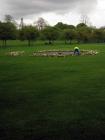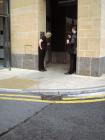Department of Archaeology

The Department of Archaeology has a teaching staff of 18, and is the oldest department of its kind in the UK. It offers undergraduate and MPhil courses in a wide range of archaeological topics, ranging in time from the Palaeolithic to the early Medieval period, and in space from the Americas to the UK and Europe, the Middle East, South Asia, South East Asia and Australia. Undergraduate students of the Department participate in field-trips and excavations as a part of their study, and also have the opportunity to be involved with fieldwork abroad.
Botanic Garden

The Botanic Garden is situated less than a mile to the south of the City centre and only five minutes walk from the railway station. This tranquil 40 acre (16 hectares) garden offers year round interest to visitors. The Garden has a collection of over 10,000 labeled plant species in beautifully landscaped settings, including Rock Garden, Lake, Glasshouses, Winter Garden, Woodland Walk, and nine National Collections.
Department of Applied Mathematics and Theoretical Physics

DAMTP aims to carry out research of world-class excellence in each of a number of groups whose interests span broad and important areas of applied mathematics and theoretical physics. In so doing it collaborates with strong groups nationally and internationally, and participates in numerous interdisciplinary projects and programmes.
Department of Radiology

The University and NHS Departments of Radiology are adjacent on the Addenbrooke's Hospital site and many operational aspects are closely integrated including clinical services, teaching and research. There are excellent links with clinical specialty groups and a wide range of regular clinico-radiological conferences which are well attended by both junior and senior staff. A wide range of modern imaging resources are available including:
Three x 1.5T GE Horizon Excite HD Whole Body MRI
Siemens Sensation 64 Multi-Detector Body CT Scanner
Department of Statistics

We list broad subject areas within pure and applicable mathematics and any associated seminar series. Details of individuals involved and their research interests can be found in the individual subject pages:
Subject Area Seminar Series
Algebra Algebra Seminar
Analysis Analysis Seminar
Complex Analysis Seminar
Discrete Analysis Seminar
Geometric Analysis and Non-Linear PDEs
Category Theory and Logic Category Theory Seminar
Combinatorics Combinatorics Seminar
Discrete Analysis Seminar
Geometry and Topology Geometry Seminar
Geometric Analysis and Non-Linear PDEs
Institute for Public Health coffe and fag break

Aims of the Institute of Public Health
to improve the health of the population by understanding of the cause and natural history of disease
to identify and evaluate new possibilities for both primary and secondary care intervention and prevention
to monitor on a population basis interventions as they are currently applied.
BP Institute

The University of Cambridge BP Institute was established in 2000 by a generous endowment from BP, which has funded faculty positions, support staff and the Institute Building, in perpetuity. The Institute research focuses on fundamental problems in multiphase flow and is highly interdisciplinary, spanning five University Departments.
Institute of Biotechnology

The Institute of Biotechnology is a centre of excellence in biotechnology research. It was established in 1988 to meet growing demands for highly skilled research personnel, and the new knowledge necessary for continuing expansion of the science platform upon which biotechnology innovations are based.
The Institute's aims are:
To conduct research in selected areas of biotechnology.
To provide the best training in biotechnology for high quality graduates from the physical, chemical, and biological sciences.
gender study

For the past ten years, the Centre has been home to innovative gender research, facilitating dialogue among an international community of distinguished gender researchers, as well as providing seminars and training programmes for graduate students right here in Cambridge. The Centre's two main functions are to act as a generator of cutting edge research and as a platform for teaching future generations.
